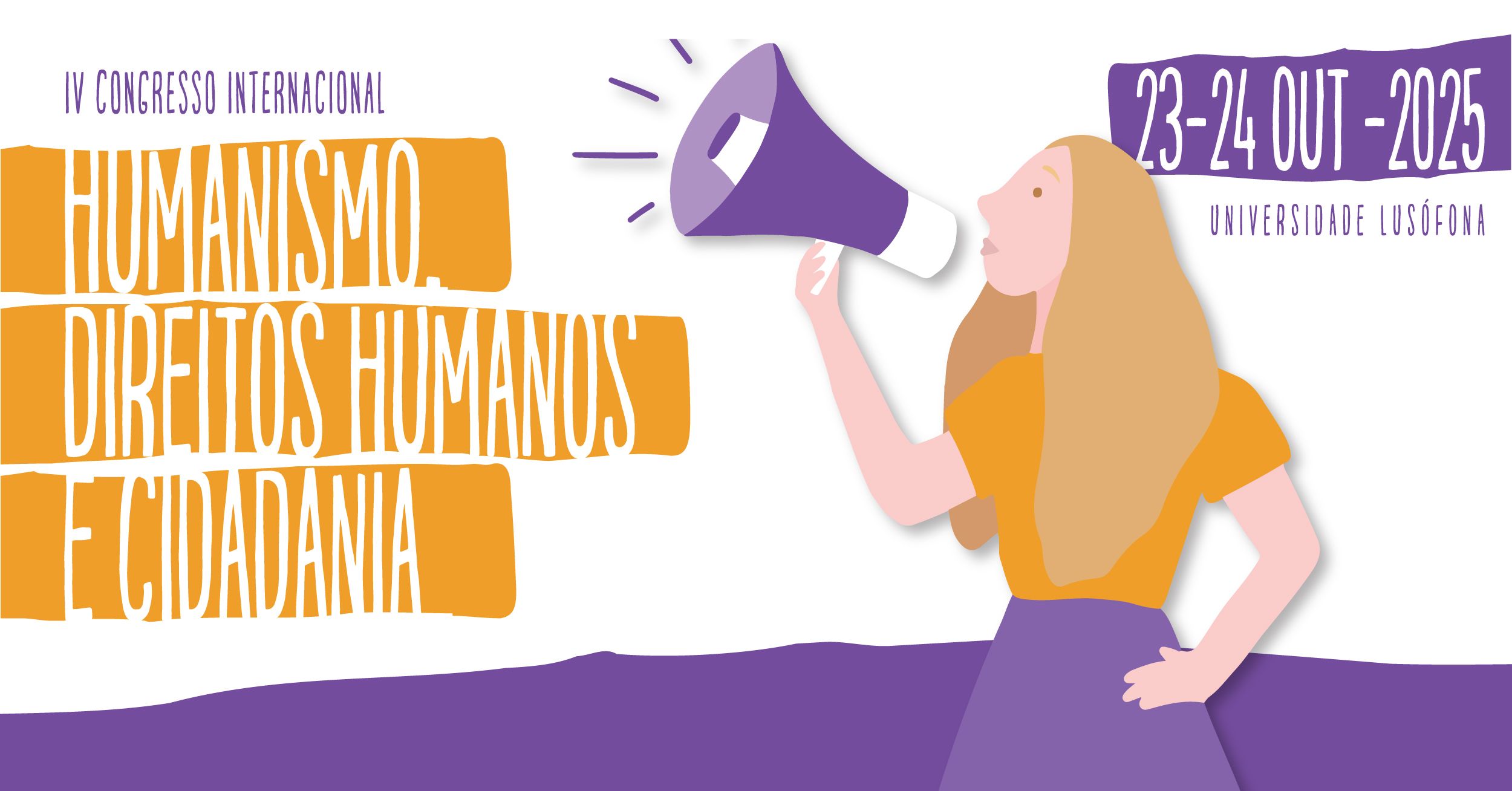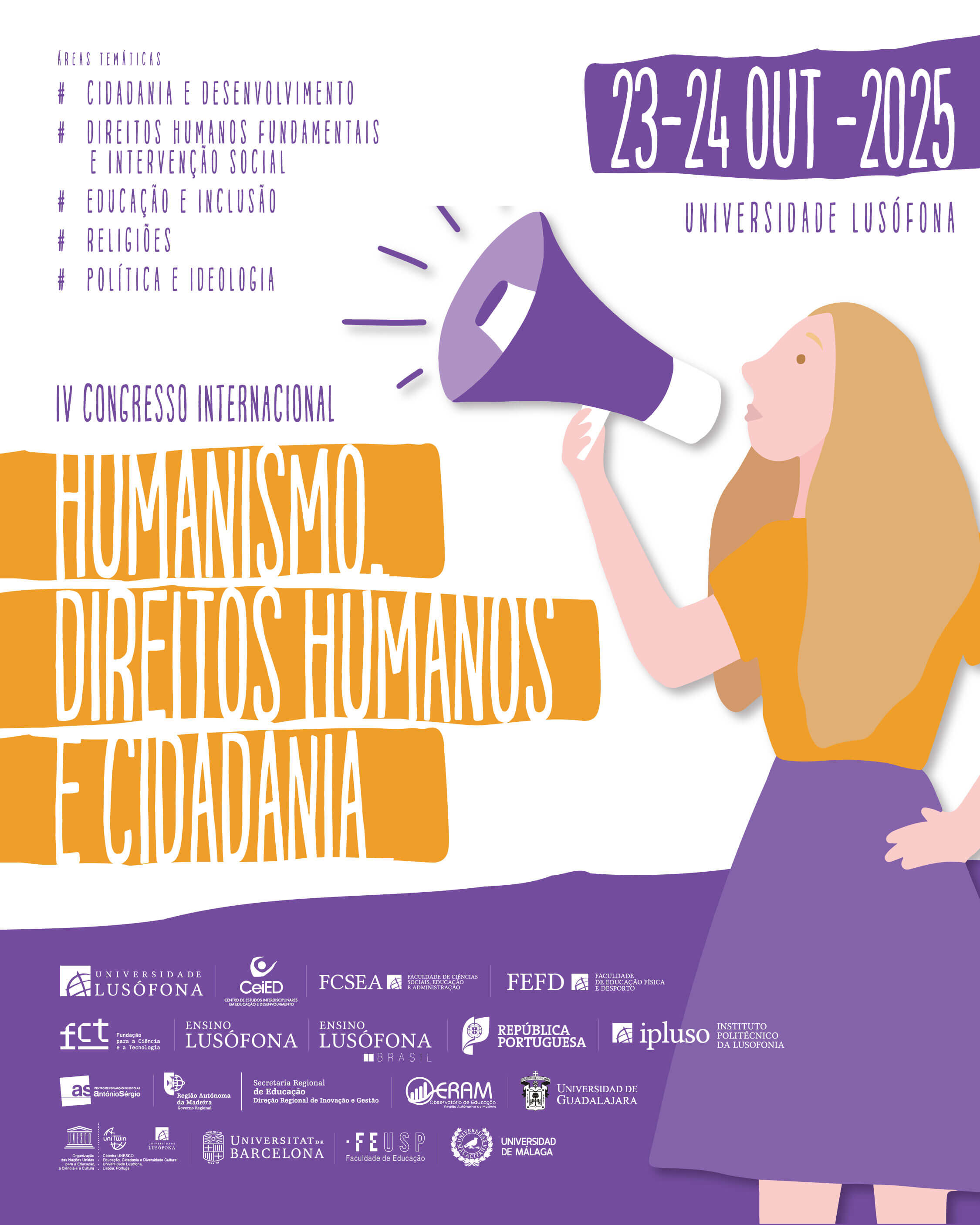Events
IV International Congress 2025 | Humanism, Human Rights, and Citizenship
October 23-24, 2025

The Congress aims to promote broad reflection on the issues of Humanism, Human Rights, and Citizenship, focusing on today’s challenges, opportunities, and threats, on questions related to the construction of full citizenship in the context of current problems, and on the impacts of crises in different spheres.
The event is held biennially under the auspices of Universidade Lusófona – University Center of Lisbon. The first three editions of the Congress took place in 2019, 2021, and 2023, respectively.
The Congress addresses various expressions of Citizenship and Humanism across diverse thematic and scientific areas, such as citizenship, citizen science, political science, culture, sustainable development, sports, citizenship education, gender equality, social and community intervention, health, social work, the knowledge society, and religion.
Through the research studies and works of its participants, the discussions and reflections on these topics provide an opportunity to produce, reflect upon, and exchange scientific knowledge around round tables and paper presentation sessions.
The Congress is intended for citizens with critical awareness, academics, researchers, educators, social workers, teachers and students, school managers and principals, covering all levels of the formal education system and informal teaching and learning contexts, as well as diverse areas of social intervention. Thus, the event is open to the participation of everyone interested in contributing with their ideas, reflections, concerns, studies, and proposals to help rethink a world marked by uncertainties.
Participation in the Congress is possible in two modalities: with or without a paper presentation, with the right to a certificate of participation and presentation of works. Papers presented in the parallel sessions will be published in an E-book.
Communications (oral or poster) must be based on empirical works related to the Congress topics, as described below.
List of Topics
CITIZENSHIP AND DEVELOPMENT (Coordinator: Professor Maria Neves)
Gender and Citizenship; Sociocultural Diversity; Space and Sustainable Development; Globalization; Sustainable Development; Artificial Intelligence and Technologies.
FUNDAMENTAL HUMAN RIGHTS AND SOCIAL INTERVENTION (Coordinator: Professor Hélia Bracons)
Citizenship; Citizen Science; Empowerment; Social Justice; Social Intervention; Nationalities; Domestic Violence; Migration and Refugees.
EDUCATION AND INCLUSION (Coordinator: Professor Luzia Lima-Rodrigues)
Inclusive School; Curriculum Flexibility; Educational and Pedagogical Practices.
RELIGIONS (Coordinator: Professor Paulo Mendes Pinto)
Religious Denominations; Culture; Ethics; Fundamentalism; System of Powers; Identity.
POLITICS AND IDEOLOGY (Coordinator: Professor José Brás)
Political Science; Citizenship; Ethnopolitics of Citizenship; Ideologies; Populism; Security; Knowledge Society; Sport.
Important Dates
- Submissions – extended until October 6, 2025
- Registrations – until October 20, 2025
- Article submission (optional) –
until December 15, 2025Extended until January 15
Submission Guidelines
The abstract must be submitted here: https://www.even3.pt/e/humanismo-528150
The abstract must not exceed 2,500 characters (including spaces and 3 to 5 keywords), and may be written in Portuguese, Spanish, English, or French. All validated and accepted abstracts will be published in an E-book.
Authorship must indicate the following information: name(s), affiliation, and institutional email address.
Any participant presenting a communication may also submit a paper. It may be written in Portuguese, Spanish, English, or French. All validated and accepted full papers will be published in an E-book.
In this case, the full article must be submitted by December 15, 2025, according to the following criteria:
- Written according to APA standards (7th ed.);
- Font Times New Roman, size 12;
- Include abstract with 3 to 5 keywords;
- Between 7 and 12 pages (including tables, figures, and references);
- Submitted as a Word file.
Program
Venue: Agostinho da Silva, Universidade Lusófona – Lisbon
Participation: On-site or online (link available on the eve of the event)
October 23 (Thursday)
08h30 – Participant Registration
09h30 – Opening Session
- Professor Manuel de Almeida Damásio – President of the Board of Directors
- Professor José Bragança de Miranda – Rector
- Professor António Teodoro – Director of CeiED
- Professor Jacinto Serrão – Congress Coordinator
10h30 – Opening Conference – “Derechos Humanos, Ciudadanía y Democracia en tiempos de auge del neofascismo: por una Pedagogía Antifascista”
Speaker: Enrique Javier Díez Gutiérrez – Professor at Universidad de León
Moderator: Professor António Teodoro – CeiED's Director
12h00 – Lunch break (free)
14h00 – Round Table I – Citizenship and Development (Coordination: Professor Maria Neves Gonçalves)
- Artificial Intelligence and Education – Professor António Lopes, National Education Council (CNE)
- Physiognomy: beauty, goodness, and the education of the gaze for citizenship – Professor José Brás, Universidade Lusófona & IPLUSO
15h30 – Parallel Sessions: Paper and Poster Presentations
16h30 - Coffee Break
16h45 – Round Table II – Religions (Coordination: Professor Paulo Mendes Pinto)
- Hope and Co-responsibility: Active Citizenship proposed by Pope Francis – Professor Joaquim Franco
- The decline of intellectualism in the Middle East as a vehicle of its instrumentalization and a new horizon of hope – Professor Khalid Jamal
18h15 – Parallel Sessions: Paper and Poster Presentations
October 24 (Friday)
10h00 – Opening Conference – “Inclusive Education: a Path of Rights and Duties”
Speaker: Professor David Rodrigues – National Education Council
10h30 – Round Table III – Education and Inclusion (Coordination: Professor Luzia Lima-Rodrigues)
- Inclusive Education: writing rights through crooked lines – Professor David Rodrigues, National Education Council
- Inclusive Higher Education: a Process — Reflections from 37 Years of Practice – Professor Lília Pires, Coordinator of the Career Guidance and Student Support Office, Faculty of Arts, ULisboa
- Curriculum, Pedagogy and Assessment: perspectives for diversity and inclusion – Professor Domingos Fernandes, President of the National Education Council
12h00 – Lunch break (free)
14h00 – Round Table IV – Fundamental Human Rights and Social Intervention (Coordination: Professor Hélia Bracons)
- Social Intervention: Creating and (Re)Creating models to maintain the purpose) – Dr. Joaquina Madeira, President of the Board of EAPN Portugal
- Rethinking Social Work as a Human Rights Profession – Professor Isabel Vieira, Faculty of Human Sciences, Catholic University
15h30 - Coffee Break
15h45 – Round Table V – Politics and Ideology (Coordination: Professor José Brás)
- Human Rights and the challenges posed by the conflicts in Ukraine and the Middle East – Dr. Helena Ferro de Gouveia, geopolitical risk analyst, commentator on international and defense issues at CNN, expert in IR from LSE, National Defense Auditor.
- Ideological Configurations of Religious Populism: The Portuguese Case – Professor Jorge Botelho Moniz, Universidade Lusófona
- Are Human Rights in Crisis? – Paulo Sargento, President of the Portuguese League for Human Rights – Civitas
17h15 – Parallel Sessions: Paper and Poster Presentations
18h15 – Closing Session
Registration
Participation in the Congress, with or without a presentation, requires mandatory registration.
| Participation Fees: | |
|---|---|
| General public, with presentation | 40 euros |
| General public, without presentation | 20 euros |
| Students and teachers from the Lusófona Education Group* | Free |
| Students from other institutions, without presentation* | 10 euros |
* You should contact the event organizers (
Accreditation for Teachers in Portugal (Optional)
Teachers from Portugal (Preschool, Primary, Secondary, and Special Education) can register for accreditation of the training course for career progression (15 hours), by completing an additional registration for 10 euros at Centro de Formação Escolas António Sérgio (cfantoniosergio.edu.pt).
ORGANIZING COMMITTEE
- Jacinto Serrão (Coordinator), Universidade Lusófona – Centro Universitário de Lisboa
- Alcina de Oliveira Martins, Universidade Lusófona – Centro Universitário do Porto
- Carla Galego, Universidade Lusófona – Centro Universitário de Lisboa
- Elsa Estrela, Universidade Lusófona – Centro Universitário de Lisboa
- Hélia Bracons, Universidade Lusófona – Centro Universitário de Lisboa
- Inês Vieira, Public Science Forum, CeiED – Universidade Lusófona – Centro Universitário de Lisboa
- Luzia Lima-Rodrigues, Center for Interdisciplinary Studies in Education and Development (CeiED), Universidade Lusófona – Centro Universitário de Lisboa
- Lygia Barreira, Center for Interdisciplinary Studies in Education and Development (CeiED), Universidade Lusófona – Centro Universitário de Lisboa
- Joaquim Melro, António Sérgio School Training Center
- José Brás, Universidade Lusófona – Centro Universitário de Lisboa
- Maria Neves Gonçalves, Universidade Lusófona – Centro Universitário de Lisboa & IPLUSO
- Paulo Mendes Pinto, Universidade Lusófona – Centro Universitário de Lisboa
- Rosana Maria de Moraes, Faculdade Lusófona do Rio de Janeiro
- Vanessa Russo, Center for Interdisciplinary Studies in Education and Development (CeiED), Universidade Lusófona – Centro Universitário de Lisboa
SCIENTIFIC COMMITTEE
- Alcina de Oliveira Martins, Lusófona University, Porto University Center
- Alejandra Montané López, University of Barcelona
- Álvaro Laborinho Lúcio
- Ana Sofia António, Polytechnic Institute of Lusophony (IPLUSO)
- António Teodoro, Lusófona University, Lisbon University Center
- Arlinda Cabral, Lusófona University; IPLUSO
- Bravo Nico, University of Évora
- Carla Galego, Lusófona University, Lisbon University Center
- Carlos Alberto Poiares, Lusófona University, Lisbon University Center
- César Correia Arias, University of Guadalajara/Jalisco, Mexico
- Dulce Franco, Polytechnic Institute of Lusophony (IPLUSO)
- Elisabete Pinto da Costa, Lusófona University
- Elisabete Pinto da Costa, Lusófona University, Porto University Center
- Emilio Lucio-Villegas, University of Seville (US)
- Ernesto Candeias Martins, Polytechnic Institute of Castelo Branco
- Federico Zannoni, University of Modena and Reggio Emilia
- Fernando Campos, Lusófona University
- Hélia Bracons, Lusófona University, Lisbon University Center
- Hermano Carmo, ISCSP, University of Lisbon
- Jacinto Serrão (Coordinator), Lusófona University, Lisbon University Center; IPLUSO
- José Brás, Lusófona University, Lisbon; IPLUSO
- Juan José Leiva Olivencia, University of Málaga
- Judite Primo, Lusófona University, UNESCO Chair - Lusófona
- Laura Ponce de León, UNED – Madrid
- Luzia Lima-Rodrigues, Lusófona University, Lisbon University Center
- Márcia Aparecida Gobbi, School of Education, University of São Paulo
- Maria João de Carvalho, University of Trás-os-Montes and Alto Douro (UTAD)
- Maria Neves Gonçalves, Polytechnic Institute of Lusophony (IPLUSO)
- Maria Teresa Santos, University of Évora
- Paulo Mendes Pinto, Lusófona Education – Brazil
- Sergio Andrés Cabello, University of La Rioja
- Teresa Lopo, Lusófona University; IPLUSO
- Wiel Veugelers, University of Humanistic Studies, Utrecht, the Netherlands
ASSOCIATED INSTITUTIONS
- UNESCO Chair: Education, Citizenship and Cultural Diversity
- Centre for Interdisciplinary Studies in Education and Development (CeiED), Institute of Education, Lusófona University
- António Sérgio School Training Centre (CFEAS)
- Centre for Research into Cosmovisions and Spiritual and Religious Worldviews (CICMER), Lusófona University
- Department of Didactics and Educational Organisation, University of Barcelona
- Department of Didactics and School Organisation, University of Malaga University of Guadalajara/Jalisco Mexico
- Department of Didactics and School Organisation, University of Málaga University of Guadalajara/Jalisco Mexico
- Lusophone Higher School of Education (ESEL) - UNESCO Associated Schools Network
- Faculty of Social Sciences, Education and Administration (FCSEA), Lusófona University
- Faculty of Physical Education and Sport (FEFD), Lusófona University
- Faculdade Lusófona da Bahia, Ensino Lusófona - Brazil
- Lusófona College of São Paulo, Lusófona Education - Brazil
- Lusófona College of Rio de Janeiro, Lusófona Education - Brazil
- Institute of Social Services (ISS), Lusófona University
- Polytechnic Institute of Lusophony (IPLUSO)
- Education Observatory of the Autonomous Region of Madeira (OERAM)
- Alumni Lusófona - Association of Former Students of the Lusófona University
- Instituto de Educação
- School of Education, University of São Paulo
Contact
For any questions or inquiries about the Congress, please contact Lygia Barreira at



